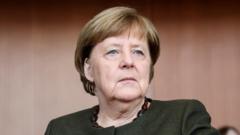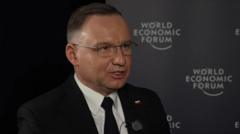The German parliament witnessed intense confrontations after a non-binding motion for stricter border controls gained support from the far-right AfD, igniting criticisms across party lines. CDU leader Friedrich Merz emphasizes public safety while Chancellor Olaf Scholz denounces the collaboration with far-right factions, revealing deepening political divides ahead of upcoming elections.
Parliamentary Tensions Rise as Far-Right Support Shifts German Asylum Policy

Parliamentary Tensions Rise as Far-Right Support Shifts German Asylum Policy
A heated debate erupts in the Bundestag as the far-right Alternative for Germany party influences new asylum regulations.
Article Text:
Germany's parliament exploded with heated exchanges and accusations on Wednesday after a significant change occurred regarding collaboration with far-right parties. A non-binding motion advocating for stricter border and asylum regulations successfully passed, thanks to the backing of the far-right Alternative for Germany (AfD) party. This unprecedented alignment prompted various politicians to express their disapproval vehemently.
Friedrich Merz, leader of the conservative CDU party and architect of the proposal, argued that the move was crucial for public safety. He remarked, "This policy isn't wrong just because it has the wrong supporters," drawing attention to rising concerns about violence related to asylum-seekers.
Chancellor Olaf Scholz responded fiercely, labeling Merz's actions as an "unforgivable mistake." Merz is now planning to present formal legislation on Friday, potentially with AfD's continued support, focusing on limiting immigration and rights for family reunifications. However, experts predict these measures may not be enacted before the snap elections in February and may conflict with EU regulations.
The emotions surrounding the AfD's involvement in the motion resonated through the Bundestag, with Merz expressing discomfort at the sight of AfD members cheering in support of the proposal. The backlash to Merz's willingness to work with the far-right has revitalized the long-standing consensus among German democrats against far-right collaboration—a principle rooted in the historical context of the Holocaust.
The urgency of the immigration debate has intensified in light of recent violent incidents involving asylum-seekers, particularly in Aschaffenburg, further complicating the political landscape as electoral campaigns heat up. The motion passed called for tightening restrictions on undocumented entrants to Germany; however, it does not require the minority government to act.
The significance of the historical commitment against collaborating with far-right factions remains paramount in German political culture. This week marked Germany’s annual commemoration of Nazi victims, emphasizing the necessity of remembering the past, a sentiment starkly opposed by the AfD.
As the current political climate shifts, sections of the AfD are classified as extremist by domestic intelligence, while polling indicates that it has gained traction at the expense of the CDU. Merz's recent pivot toward the far-right could alienate centrist voters who supported his predecessors, steering a dramatic departure from Angela Merkel's more moderate approach to immigration.
Critics argue Merz's abandonment of the principle against far-right collaboration signifies a perilous gamble inherently prone to fracturing the CDU's traditional voter base. The cheers from AfD members during the parliamentary vote underscore this dangerous new chapter in German politics. The tension encapsulated in Wednesday's debate indicates that the dissolution of long-held political barriers may be underway as the nation approaches pivotal elections.
Germany's parliament exploded with heated exchanges and accusations on Wednesday after a significant change occurred regarding collaboration with far-right parties. A non-binding motion advocating for stricter border and asylum regulations successfully passed, thanks to the backing of the far-right Alternative for Germany (AfD) party. This unprecedented alignment prompted various politicians to express their disapproval vehemently.
Friedrich Merz, leader of the conservative CDU party and architect of the proposal, argued that the move was crucial for public safety. He remarked, "This policy isn't wrong just because it has the wrong supporters," drawing attention to rising concerns about violence related to asylum-seekers.
Chancellor Olaf Scholz responded fiercely, labeling Merz's actions as an "unforgivable mistake." Merz is now planning to present formal legislation on Friday, potentially with AfD's continued support, focusing on limiting immigration and rights for family reunifications. However, experts predict these measures may not be enacted before the snap elections in February and may conflict with EU regulations.
The emotions surrounding the AfD's involvement in the motion resonated through the Bundestag, with Merz expressing discomfort at the sight of AfD members cheering in support of the proposal. The backlash to Merz's willingness to work with the far-right has revitalized the long-standing consensus among German democrats against far-right collaboration—a principle rooted in the historical context of the Holocaust.
The urgency of the immigration debate has intensified in light of recent violent incidents involving asylum-seekers, particularly in Aschaffenburg, further complicating the political landscape as electoral campaigns heat up. The motion passed called for tightening restrictions on undocumented entrants to Germany; however, it does not require the minority government to act.
The significance of the historical commitment against collaborating with far-right factions remains paramount in German political culture. This week marked Germany’s annual commemoration of Nazi victims, emphasizing the necessity of remembering the past, a sentiment starkly opposed by the AfD.
As the current political climate shifts, sections of the AfD are classified as extremist by domestic intelligence, while polling indicates that it has gained traction at the expense of the CDU. Merz's recent pivot toward the far-right could alienate centrist voters who supported his predecessors, steering a dramatic departure from Angela Merkel's more moderate approach to immigration.
Critics argue Merz's abandonment of the principle against far-right collaboration signifies a perilous gamble inherently prone to fracturing the CDU's traditional voter base. The cheers from AfD members during the parliamentary vote underscore this dangerous new chapter in German politics. The tension encapsulated in Wednesday's debate indicates that the dissolution of long-held political barriers may be underway as the nation approaches pivotal elections.






















